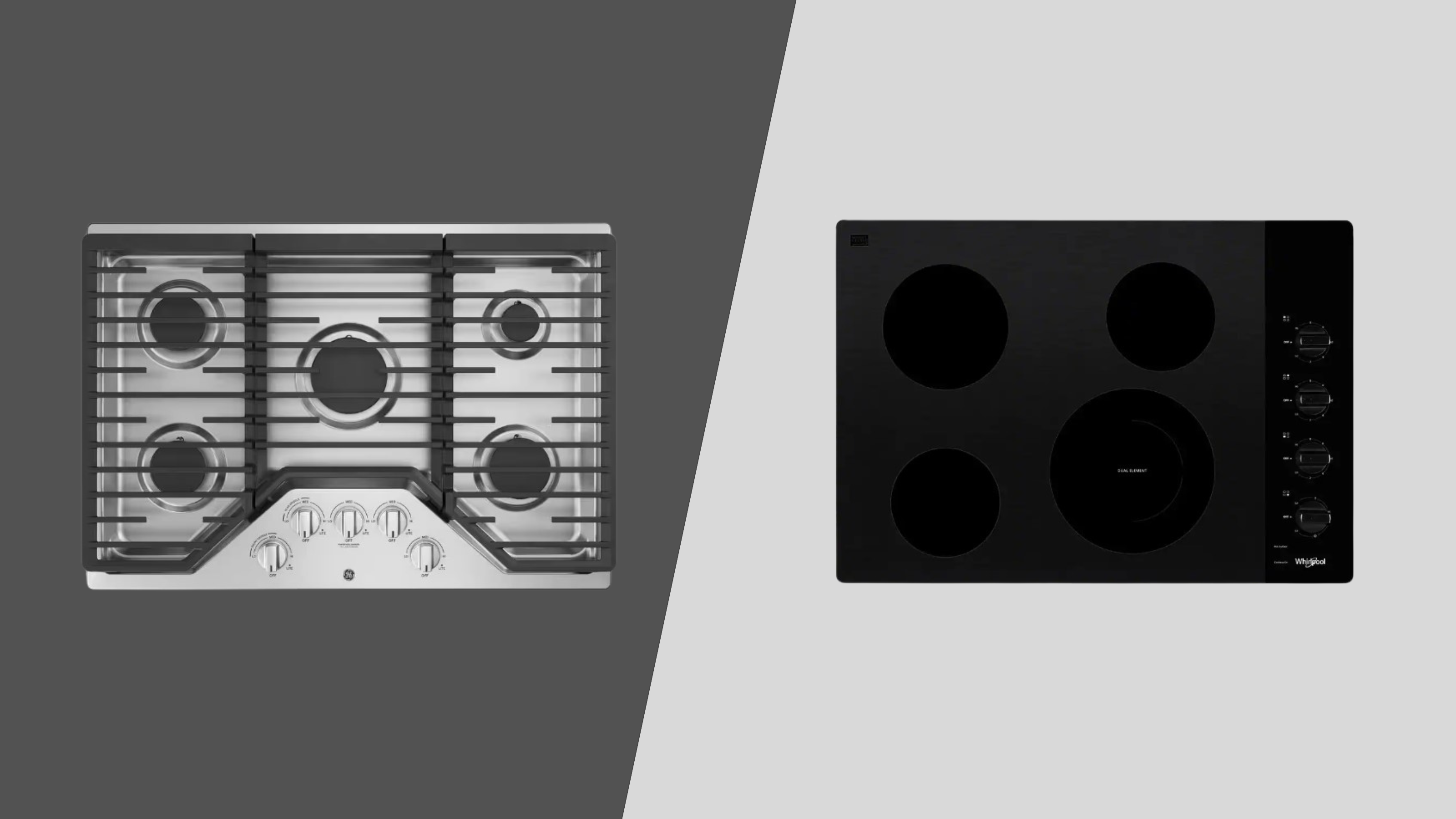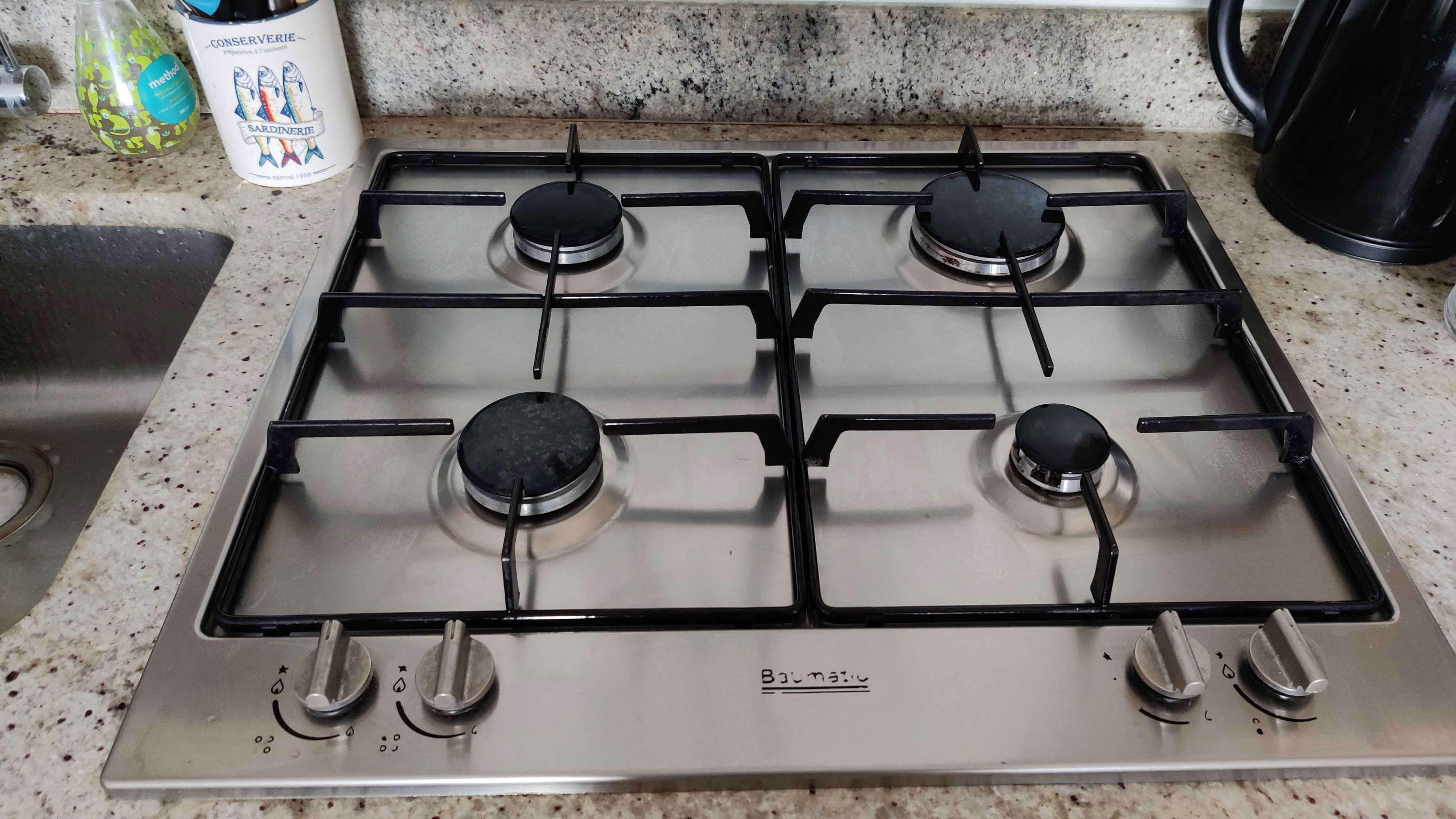
Type of cooker: Gas
Burners: 5
Material: Stainless steel
This gas cooktop from GE has five burners, with a 'power burner' with 15,000 BTU for when you need quick high heat and a precision burner for low simmers. The heavy cast, edge-to-edge grates are removable and dishwasher-safe for easier cleaning, and the appliance comes with a limited one-year warranty.
For
- Five flame burners
- Great cooking performance
- Power burner
Against
- Can be fiddly to clean
Type of cooker: Electric
Burners: 4
Material: Ceramic glass
In a polished, ceramic glass design, this electric cooker from Whirlpool has four burners, including a dual-element burner with a smaller inner ring that can expand into a 10-inch outer ring for larger cookware. The flat surface is easy to clean, and a light will let you know when the heating elements are still warm to the touch.
For
- Easy to clean
- Sleek design
- Low maintenance
Against
- Less cooking control than gas
If you're at the exciting point in your life where you can decide between gas vs electric stoves for your kitchen, you'll know that it isn't a decision to be taken lightly.
The best gas ranges and the best electric cooktops come with their own set of strengths, and uncovering which one is best for your kitchen and your cooking needs involves seeing exactly what each cooktop offers.
Whether you're looking at the whole range or adding a cooktop above one of the best ovens, we dive into the design, cooking performance, safety, maintenance, and price factors to consider with gas and electric stoves (and induction, too).
We've also caught up with appliance expert Alexander Hill about the strengths, weaknesses, and differences between the two types of cookers.
And while you're at it, be sure to read our guide on gas vs electric ovens to discover more about your kitchen appliances.
Gas vs electric stoves: Design
Gas stoves use an open flame to cook food, while electric stoves use heating elements. Whether the heating elements are metal, ceramic-glass, or induction, electric cooktops offer a flat surface for even and consistent cooking across the whole surface. Gas cookers rely on heat provided by the flame.
Gas cookers use one of two types of ignition: a pilot light or an electronic ignition. An electronic ignition system creates a spark when you turn the burner on, whereas a pilot light has a constantly burning flame next to the burner. Naturally, pilot lights use a lot more energy.
Standard electric stoves often heat up by sending electricity to internal coils underneath the cooker's surface. These tend to be slower as the element will take time to heat, but the benefit here is that they provide "a more even surface temperature, which is great for flat-bottomed cookware," Alexander explains.
Due to how much electricity is required for electric stoves, gas is the more energy-efficient option. Induction stoves are designed differently from standard electric ones; however, using electromagnetic energy with compatible cookware to create heat and are said to be more energy-efficient than their gas counterparts.
Visually, gas stoves offer a more traditional look in the kitchen and perhaps one that's more familiar to those who have lived in older homes. Electric stoves can range from flat, grey discs to sleek, polished worktops—and there's a great deal of choice to match your kitchen's style.

Because of these differences, each stove requires a different setup. Gas stoves will need to be hooked up to a home's gas supply, and electric stoves will have dedicated power connectors to access the home's electricity. Both come with their own set of risks, as gas leaks or faulty wiring will need to be avoided when installing a cooker in your home.
As Alexander explains, it's also worth noting that "gas stoves emit more ambient heat into the kitchen." This can be felt in warmer climates or in homes with poor ventilation, so it might be beneficial to choose electricity if your home needs to keep things cooler.
Gas vs electric stoves: Cooking performance
As the flame is ignited instantly, gas stoves will typically heat up your cookware more quickly. Instant heat and precise temperature control are two of the reasons why gas stoves are preferred by many professional chefs.
"The flame allows for quick adjustments, which is particularly beneficial for dishes that require sudden changes in heat," Alexander explains. Charring or flambéing are examples of cooking techniques that require the heat and intensity of a flame.
Electric cooktops provide limited temperature control and typically won't offer the same tactile control over the heat application as gas. Saying that, "induction cooktops offer rapid heating and precise control, rivaling gas," Alexander adds.
But what induction lacks is the ability to maneuver your cookware, as it must be touching the stove to be able to apply heat. Induction stoves are also only compatible with magnetic induction pans, meaning a switch to an induction stove often comes with needing to buy a new set of cookware.
"Electric stovetops may require flat-bottomed cookware for optimal heat transfer," says Alexander, whereas gas stoves are compatible with nearly any type of pan. Also, the surface of an electric stove will stay warm for a while after it's turned off, so pans will continue to be heated, whereas gas cookers extinguish the heat instantly (and induction cookers cool down very quickly, too).
Gas vs electric stoves: Safety & Maintenance
Easily one of the biggest advantages of any electric cooking surface is how easy they are to clean. Whether it's induction or standard, the flat surface makes both light wiping and deep cleaning a painless task—all you have to do is wait for the surface to cool down.

Gas stoves, on the other hand, can be quite fiddly, with small crevices around the burners to clean and removable grates and burner caps to take care of. Food and grease can easily build up around these components, and it's not as easy as wiping down a flat surface.
"Gas stovetops also require occasional maintenance to ensure the burners are functioning correctly," Alexander adds. "This can involve checking for clogged burner ports and ensuring the igniter is clean and functioning."
Electric stoves require less maintenance but are more prone to damage like scratches and cracks. Abrasive cleaners and scouring pads should be avoided, and spills need to be cleaned quickly so that they don't burn onto the cooker's surface.
In terms of safety, the main risk to consider here is the open flame hazard from gas cookers, but electric cookers can also be harmful when touched without realizing they're still hot. Most often, the heating element will be visibly red, or there'll be a light displaying when it's still warm—but this is not always the case.
Gas vs electric stoves: Price
Gas and electric stoves are pretty similar in terms of price. You can find most options between $600 and $1200 (and this is often the price for a full range with the oven included).
But down the line, gas stoves are much cheaper to run than electric ones as they use less energy. Induction cookers, however, are more efficient than standard electric ones and often end up cheaper to run than gas stoves, thanks to their energy efficiency.
Gas vs electric stoves: Our verdict
Gas offers the best cooking capabilities of any cooker. Precise temperature control, maneuverability, flame cooking, and instant heat are qualities that are unmatched in electric cookers. For anybody who prioritizes cooking ability, gas is still the strongest option.
But for people who focus less on specific cooking techniques, and are more interested in a safe and low-maintenance stove, electric is the way to go. And to take it a step further, induction offers a great deal more cooking power, better energy usage, and easier maintenance than standard electricity, but this often comes at a higher cost.







